Withings ScanWatch Nova review: analog looks with exceptional digital brains
Withings ScanWatch Nova: Two-minute review
Smartwatches have become ubiquitous in society. Certainly spearheaded by the arrival of the Apple Watch, you now can’t go anywhere without seeing a digital display on someone’s wrist. It could be argued that until we had the smartwatch, we didn’t know we needed it and we were perfectly content with a classic analog wrist watch to simply tell the time.
Withings has championed a combination of past and present with all of its watch releases – something it has dubbed as a ‘hybrid’ design – and the ScanWatch Nova is the latest model (alongside the ScanWatch 2) that combines analog looks, health and fitness tracking and a few smartwatch niceties into one elegant package.
Using the previous ScanWatch Horizon as its starting base, the ScanWatch Nova takes what we considered to be a winning formula, and makes aesthetic and technological improvements to make this one of the best smartwatches for those who prefer classic looks, but who are also intrigued by sensors to track their overall health.
As with its predecessor, a quick glance at the ScanWatch Nova doesn’t immediately give away the fact it has digital sensors for a brain instead of a traditional watch movement. Its polished chrome body, analog hands with glow-in-the-dark LumiNova coating and rotating crown, give the impression this could be something straight out of Switzerland.
Look a little closer though, and instead of a traditional chronometer or seconds-hand ticker, you’ll notice a small OLED display at 12 o’clock and a second dial at 6 o’clock that displays your progress towards your health goal in the form of 0 to 100%. The previous ScanWatch Horizon exhibited essentially the same design, but Withings says the resolution of the OLED display has been improved this time around and the watch itself is sleeker in design.
I’d have to agree. Having worn both (and still owning the Horizon) the Nova’s case has more rounded edges and the lug around the crown has been reduced. When wearing the Horizon, I found it could occasionally dig into my wrist when I bent my hand, but with the Nova, that’s been resolved. The display is definitely a tad sharper as well, and scrolling text across the display moves at a readable speed and is clearly legible.
On the rear is a quartet of sensors to track your heart rate, 24/7 temperature, ECG and blood oxygen levels. As before, interacting with the crown doesn’t adjust the time or date, but instead brings the OLED display to life, whereby you can then scroll through the various menus and data.
In the ScanWatch Nova, Withings is once again putting a firm focus on your health. You can use it to track workouts and it will display notifications from your smartphone apps, but this is a watch that ultimately wants to keep an accurate record of how your body is performing and all data is presented in the thoughtfully designed HealthMate companion app. It can also be exported to (and imported from) your phone’s native health app.
Battery life is once again excellent with Withings accurately claiming 30 days of use, and what I particularly love about this new model is the charger. The charger that came with the ScanWatch Horizon was terrible; it didn’t magnetically attach to the watch which meant it could easily fall off. The new charger is like a cradle you have to physically insert the ScanWatch Nova into, where it’s held in place.
As my US colleague Lance Ulanoff said of the ScanWatch Horizon, the ScanWatch Nova is the perfect smartwatch for those who don’t want one, or who at least want to be more inconspicuous in owning one. It collects a vast amount of data with accuracy, presents it well in a companion app and lasts forever on a single charge. For me it’s the perfect smartwatch and so I encourage everyone to give it a try.
Withings ScanWatch Nova: Price & availability
The Withings ScanWatch Nova launched on December 5, 2023 and was available from Withings in the US and UK directly on the same date for $599.95 / £549.95. It arrived in Australia in March 2024 for AU$799 at third-party retailers.
This does make it more expensive than the Apple Watch Series 9 and not a huge amount cheaper than the Apple Watch Ultra in comparison. iPhone users will get more use from the Apple Watch and there’s a huge amount more in the way of customizing how it looks, but the Apple Watch’s battery doesn’t last nearly as long.
- Value score: 3.5/5
Withings ScanWatch Nova: Specifications
Withings ScanWatch Nova: Design
- Slimmer than previous ScanWatch Horizon
- Improved display resolution
- Looks and feels like a traditional diver’s watch
The Withings ScanWatch Nova employs a 42mm watch face and a design reminiscent of traditional diver’s watches. If you’ve always looked at other smartwatches but haven’t admired their use of all-digital displays then a hybrid smartwatch such as the Nova is ideal. I’m personally in this camp myself.
I used to own an Apple Watch Series 3 about five years ago, but stopped wearing it because I wasn’t using it to its full potential, and preferred to wear a traditional watch instead. Because the Withings ScanWatch Nova combines this traditional look with health-tracking capabilities, it makes it the perfect smartwatch in my opinion.
While the Nova employs a similar design to the Horizon, Withings has made some notable improvements. It’s slimmer in the body (and 1mm narrower on the watch face) and has gone on a weight loss kick, shaving its weight down from 72g to 52.6g. This makes a huge difference for everyday wear. The ScanWatch Horizon didn’t necessarily feel heavy, but in comparison it’s like wearing an anvil tied to your wrist compared to the featherweight nature of the ScanWatch Nova. The lighter design also makes it more comfortable to wear to bed at night, which is something you should do, since it can track your sleep and present you with a sleep performance score the next morning (more on that later).
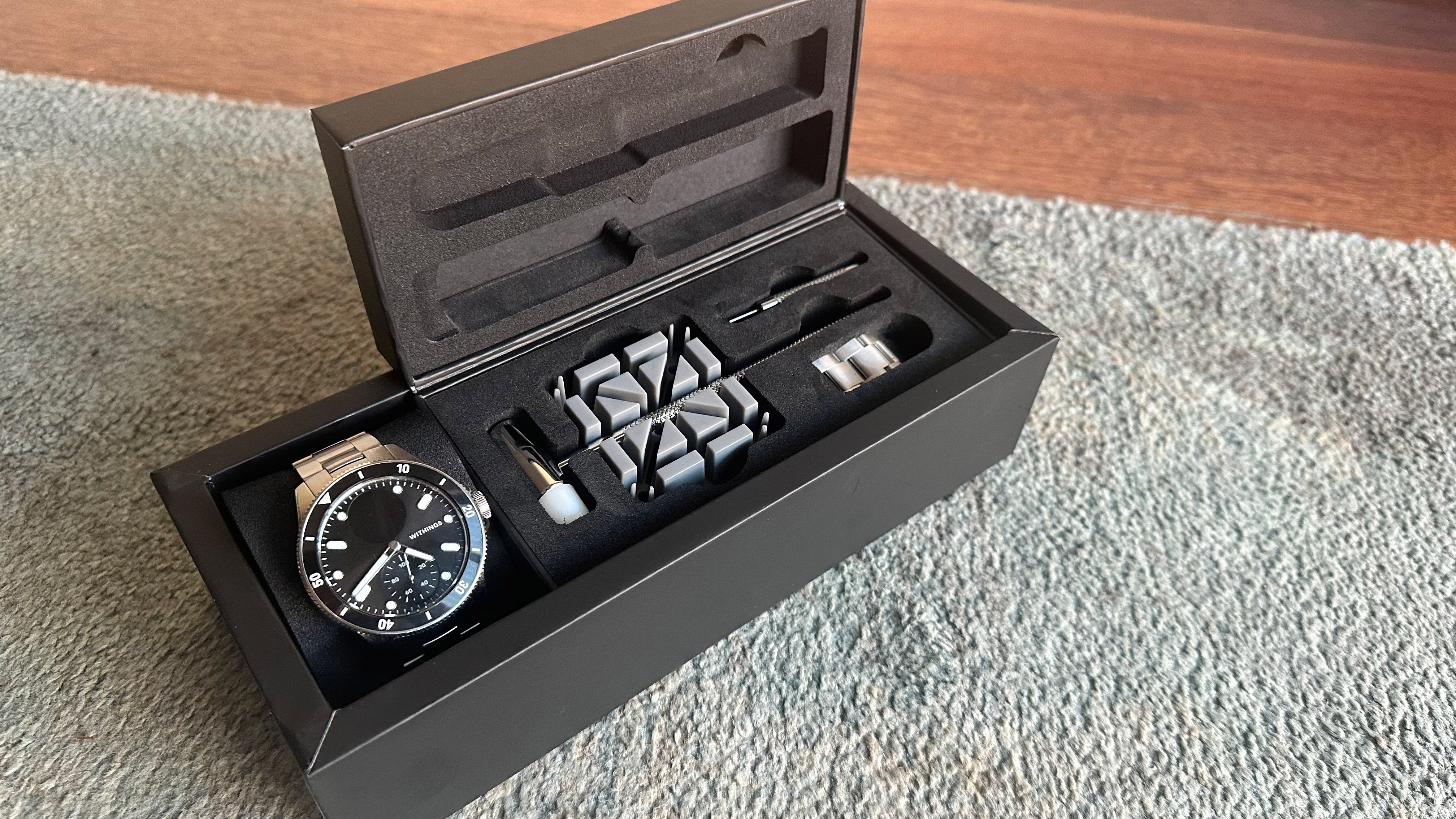
Withings ships the ScanWatch Nova with everything you need to get the perfect fit too, including spare links for the oyster metal bracelet should you need to make it larger, and a plastic holder and metal hammer to help you in adding or removing links as required. Finding the perfect fit is paramount to ensuring the ScanWatch Nova records accurate data. When we reviewed the ScanWatch Horizon we found this tricky to do, especially with the metal bracelet. I don’t think anyone should have too much issue getting a good fit with the Nova though as you’re able to remove full-size or half-size links from the bracelet.
There’s also a fluoroelastomer sport brand included which matches the color of the dial – it’s available in black, green and blue – which is soft and flexible and should provide a more secure fit if you struggle with the oyster metal bracelet. Both wristbands have a quick release function to make switching easy, although I found them easier to remove than to put back on, since they require you to compress some tiny pins that my chubby fingers had a bit of trouble with. In the UK and US you can choose from a variety of other sports and leather wristbands when buying directly from Withings, but customers in Australia are limited to just the two that come in the box.
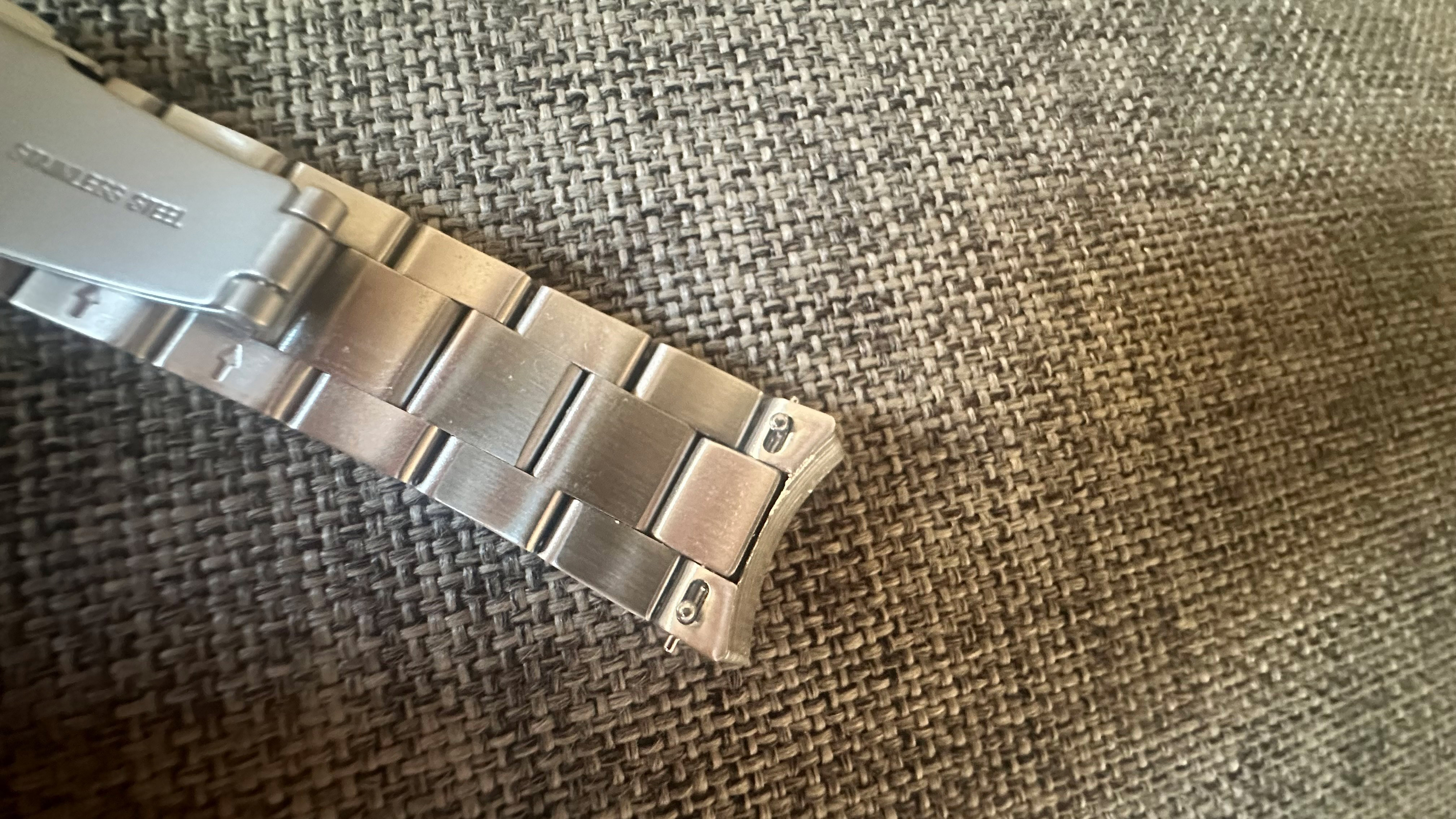
At 12 o’clock you’ll find a 0.63-inch digital display which is the clearest indicator that this isn’t a traditional analog watch. It’s slightly larger than the Horizon’s 0.5-inch screen and Withings says it has increased the resolution to improve legibility too. I have to agree, as comparing the two side by side does reveal a clear improvement in the Nova’s display. Text is that little bit clearer, sharper and more legible. I certainly had no issues reading the display and thanks to an ambient light sensor, it will automatically adjust the brightness when required. If you want to view the display but the hands are covering it, a press of the crown will see them both immediately move out the way and settle at the 10 and 2 positions. If neither of the hands are covering the display, they’ll remain where they are when you press the crown.
The way you interact with the ScanWatch Nova is similar to how you would an Apple Watch in the fact that you scroll the crown to cycle through menus. But there’s no touchscreen option here and the menus are black and white only. I like this more basic approach, I found it to be incredibly intuitive and there’s no risk of selecting the wrong app or option.
- Design score: 4.5/5
Withings ScanWatch Nova: Features
- Sensors to track a range of health metrics
- Automatic sleep and workout detection
- Single-line app notifications
There are four sensors on the back of the ScanWatch Nova for heart rate, SpO2, electrocardiogram (ECG) and a new TempTech24/7 module which is the main upgrade over the previous ScanWatch Horizon. You’ll find the same set of sensors on the recently released ScanWatch 2 as well. The main difference between the ScanWatch 2 and the ScanWatch Nova is their design, with the former taking on a more dress watch style appearance.
Using these sensors and obtaining data is incredibly easy and when you first connect the ScanWatch Nova to your phone and the companion HealthMate app, you’re presented with tutorials for each to get you up to speed.
Your heart rate and 24/7 temperature run continuously in the background and you only need to scroll to either of them in the menu to view the current reading. For SpO2 and ECG readings, you need to cover the watch face with your other hand for 30 seconds since the watch face doubles up as a sensor. Naturally, you’re not going to be able to see when the 30 seconds is up, so the ScanWatch Nova provides a rather lovely vibration to let you know the time is up. As soon as a reading is taken, you’ll get a pop-up notification on your phone directing you to view the results.
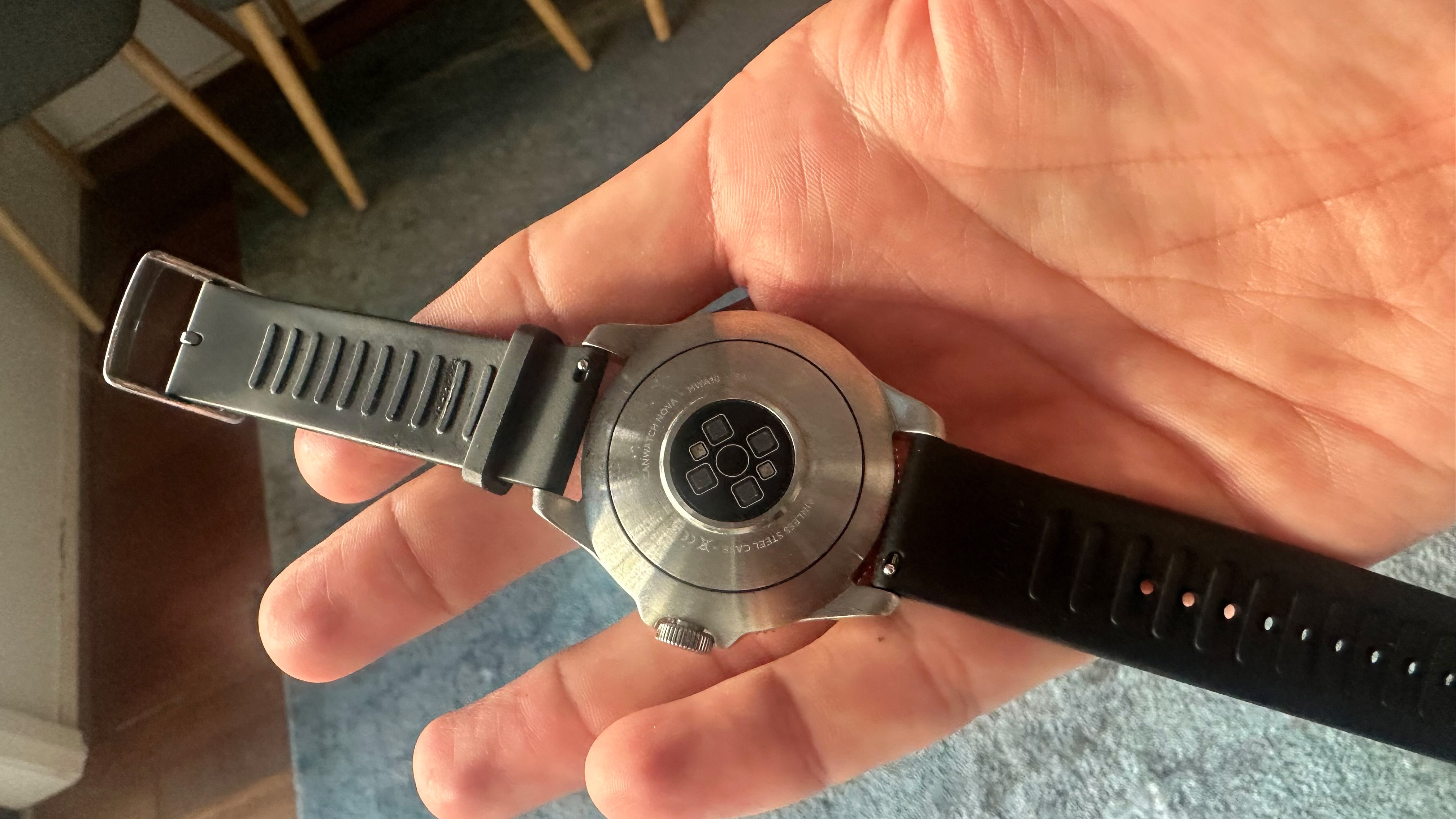
I had no issues obtaining an ECG result (mine was normal) but on the first few tries the Nova wasn’t able to record an SpO2 reading. I have to put this down to me not putting my hand on the watch face correctly (somehow) as on the third try it worked fine (and I was normal, again).
The Withings ScanWatch Nova isn’t the only smartwatch to offer this functionality of course – although it is the first health wearable to offer the 24/7 temperature tracking – but it is one of the few that is clinically evaluated and developed in collaboration with doctors and health professionals (Withings does say the SpO2 sensor is non-medical grade). Withings claims the 24/7 temperature tracking, which provides “baseline fluctuations of day and night body temperature,” can help to indicate the onset of an illness or other health conditions. You can also share your health reports directly with doctors via the HealthMate app.
More features are due in 2024 including irregular heart rhythm notifications and your respiratory rate.
Data recorded is displayed clearly in the HealthMate app although it somehow recorded two sets of sleep data on the first night I wore it to bed. One gave a sleep score of 20 and the other a score of 89. I’m taking the latter as being the more accurate. The ScanWatch Nova automatically detects when you go to sleep by the way, so no need to activate any settings before you nod off.
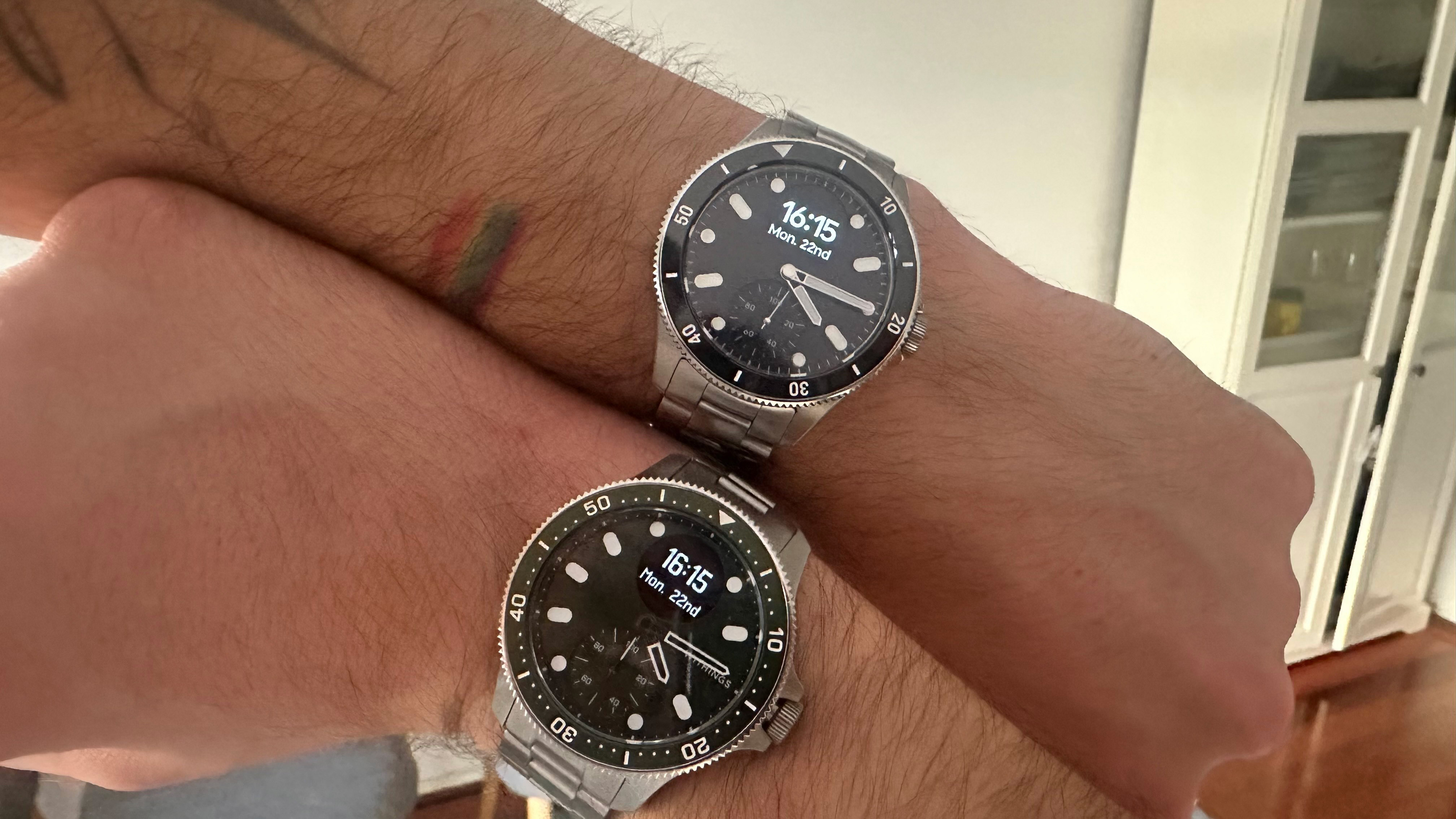
If you want to use the ScanWatch Nova to its full potential then it can also track a range of workouts. Your options are limited to running, walking, swimming, cycling and “other”. New for the Nova is the ability to automatically detect workouts – something the Horizon couldn’t do – but if for whatever reason it doesn’t, you’ll need to navigate to the workout type and press the crown to begin. A long press of the crown will pause the workout and a further long pause will restart, or you can scroll to the square stop icon on the screen and long press to end.
When you start a workout, you’ll also find start and stop actions, along with live data in the app. The ScanWatch Nova doesn’t have built-in GPS either, but can use the GPS capabilities of your phone to accurately track your workouts. This of course means you can’t leave your phone at home, but if you workout with music, you’ll likely have your phone with you anyway.
I don’t mind this stripped back approach, not least because I’m not exactly the workout type but because when I see other fitness trackers offering support for things like yoga and pilates, I have to wonder exactly what they’re tracking. But, it would be fair to say that the ScanWatch Nova is a health tracker first and a fitness tracker second. If you’re a triathlete or ultra marathon runner, then this likely won’t be the watch for you, although you will no doubt benefit from the accurate and insightful health data.
Finally, because it is also a smartwatch, the Withings ScanWatch Nova will display messages and notifications from apps installed on your phone. You can choose which apps you do and don’t receive notifications from within the HealthMate app. I personally just kept notifications from messaging apps turned on and everything else turned off. When I receive a message, it’s displayed on the small OLED screen, with text scrolling across in a single line.
Some people may prefer to see an entire message and also to be able to reply to messages from their watch. That’s not possible with the ScanWatch Nova, but again for me, I like it. My opinion towards smartwatches is that they’re simply an extension to a phone, not a replacement for one. If I see a message come through on my watch, my first instinct is to then get my phone out of my pocket to read it fully and respond, I’m not going to be someone who speaks into their watch to dictate a message. It could well be this interaction, or lack thereof, that will persuade someone to buy the Withings ScanWatch Nova. It is a totally different product to something like the Apple Watch, which does offer a lot more in terms of interactivity.
- Features score: 5/5
Withings ScanWatch Nova: Performance
- Accurate measurements from sensors
- Impeccable battery life
- A few niggles with automatic sleep and workout detection
In relation to its fitness tracking capabilities, the Withings ScanWatch does a very good job of recording accurate measurements when you select a workout as well as automatically recording when you go to sleep. I say very good, rather than great, because there are a couple of niggles.
Starting with sleep, in general the Nova does indeed notice when I’ve gone into full sleep mode and the morning after it displays the various stages of sleep in the HealthMate app. However, the night before writing this section, I happened to get very lucky and fall asleep at 4.30pm. I woke up at around 12.30am before managing to get back to sleep for another few hours. Following on from my initial observations earlier, the ScanWatch Nova once again only tracked the first period of sleep but for some reason didn’t pick up the second stage. The most recent tracked sleep falls under a “Last Night” banner, as opposed to the day of the week it occurred, so I have to wonder if it only assumes there can be one period of “Last Night’s” sleep.
With regards to workouts, the ScanWatch Nova does automatically detect when you’re performing an activity, although when I looked in the app to view data, it had detected seven cycling sessions which is strange, since I don’t even own a bike, let alone cycle. All it could show was the duration of time and the day they occurred. No distance or speed. This is, however, likely because at the time I didn’t have GPS enabled on my phone.
The morning of writing this section of the review I decided to walk to work, since I was feeling so refreshed from the 16 hours or so of sleep from the night before. To ensure it would accurately record my walking data, I selected ‘Walking’ from the workout menu on the watch itself and enabled GPS. When you have a workout mode enabled, the screens you scroll through change from the default options. The first screen still shows the time in digital format, but underneath you’re also shown the distance travelled.
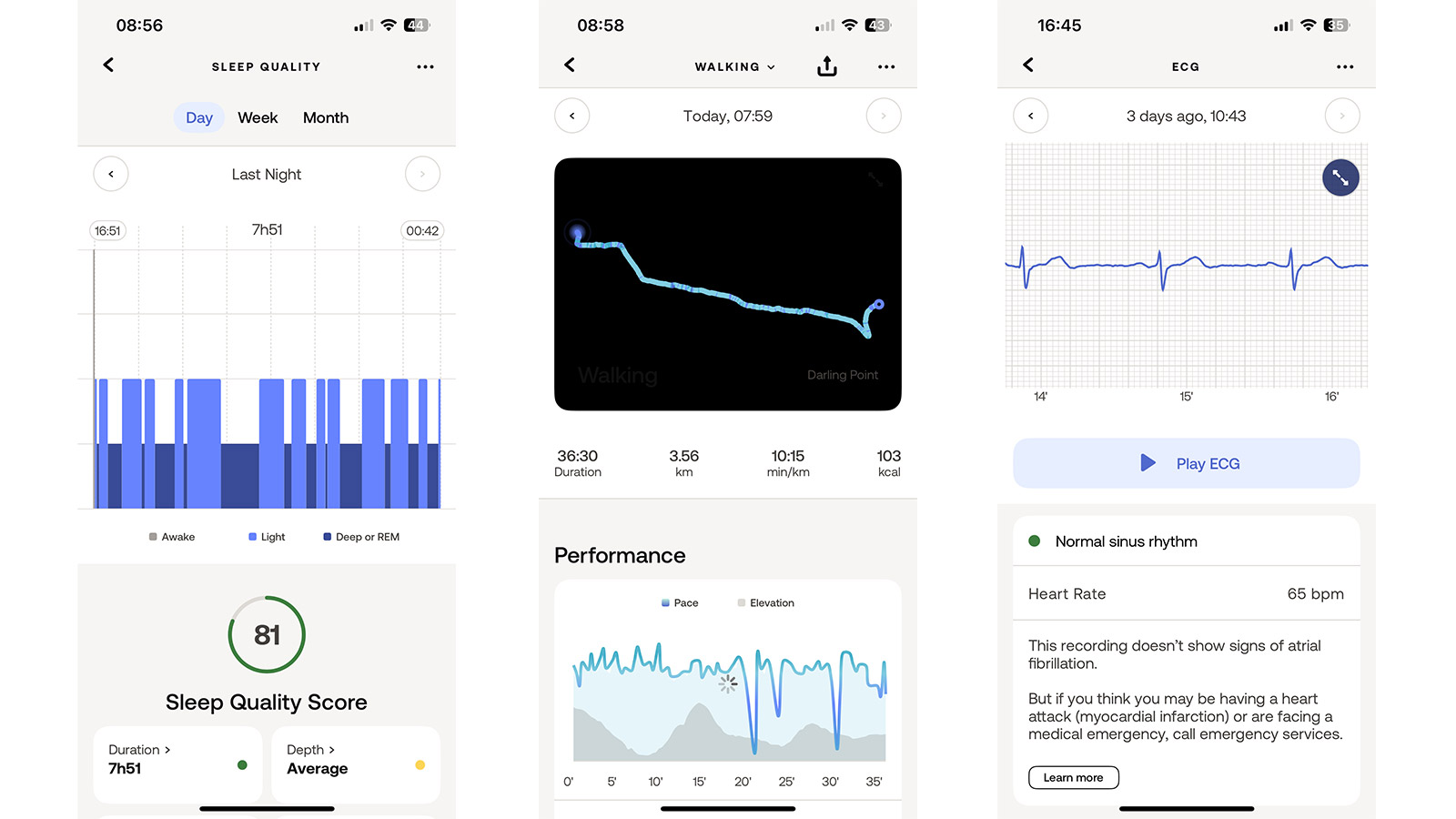
Interestingly, the map data recorded within the app showed a black screen with the route I took. Selecting it did bring up a view within Apple Maps and my walking workout data overlayed, so I'm going to put this down to an app issue. Also interestingly, walking data recorded later the same day by automatic detection didn't show any GPS map route. It seems the only time you'll see that kind of data is when you actually select a workout on the watch.
When you scroll, you can view your heart rate, pace and body temperature. Of course, on something like an Apple Watch, you can view multiple metrics of data on one screen which will undoubtedly be more useful for real fitness fanatics. But for someone like me who doesn’t pour blood, sweat and tears into keeping fit, I was still grateful for the accurate tracking.
As for health tracking, all recorded data is presented neatly and efficiently in the companion app. Understanding that the average person is unlikely to know what a good or bad ECG or oxygen saturation reading is, the app gives a green tick of approval if you’re in good shape.
Generating data is simple too, as both the watch itself and the app give you instructions for how to record an ECG and SpO2 reading. You’re required to put your hand over the watch face, since this doubles up as a sensor, and the watch will give off a vibration when the 30 second recording period is up.
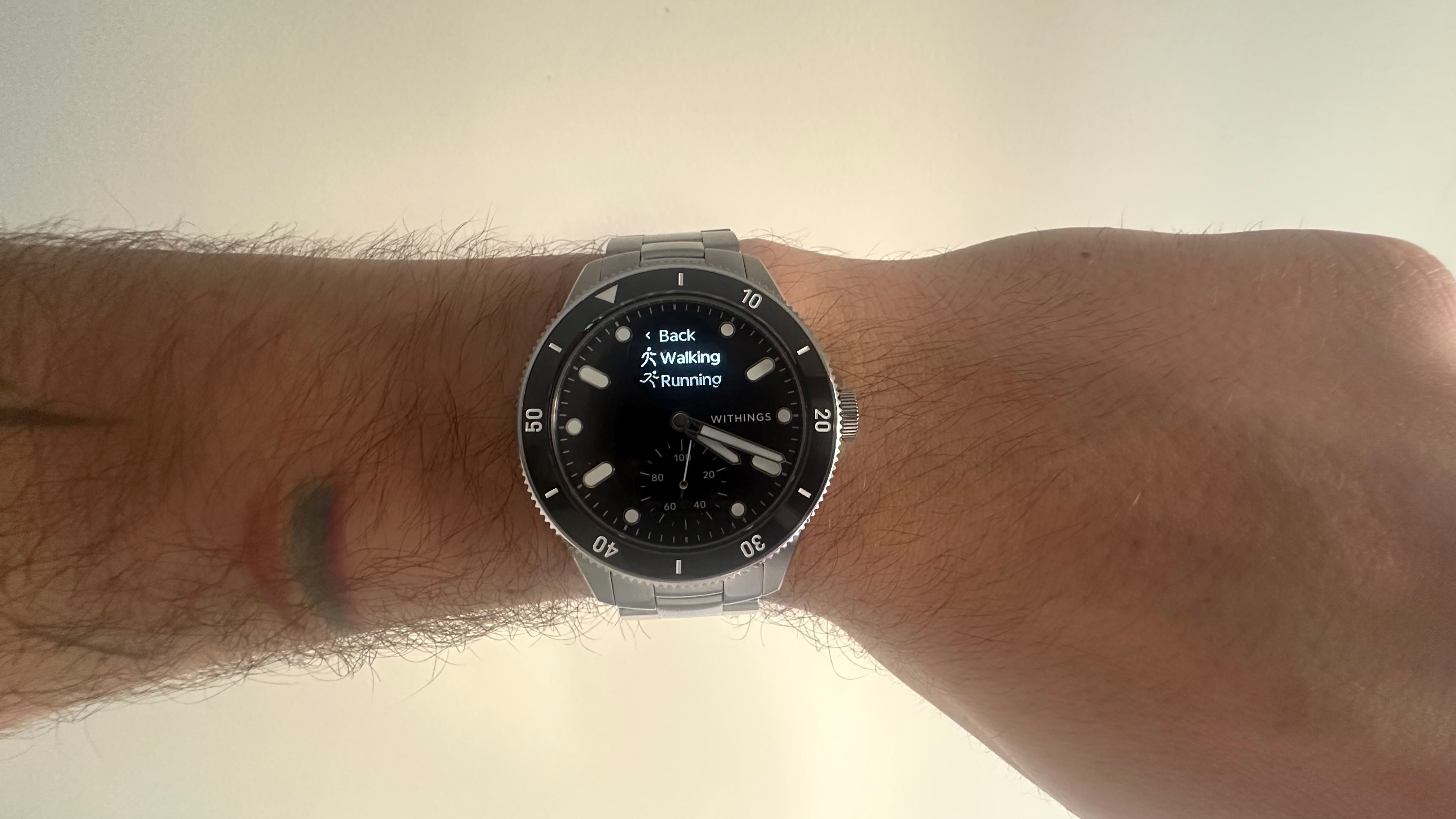
Along with choosing which apps you want to display notifications, you can also customize other aspects of the watch from within the app, such as the order of workout options or the order of screens that show up when you scroll through with the crown. I chose to move Walking to the top of the list, since this was the one I was going to be using the most.
The app also lets you know how much battery the ScanWatch Nova has left – after wearing it almost constantly for a week, I still have 54% at the time of writing – and you can also set an alarm to wake you up in the morning. What you can’t do with the app or the ScanWatch Nova, is activate any kind of Find My feature. This means if you lose the Nova somewhere, or simply forget where you put it at home, you can’t enable it to play any sounds to help you locate it. While it could be fair to assume that Withings expects the ScanWatch Nova will be on your wrist almost 24/7 (especially if you want to constantly track sleep) the fact remains you will likely take it off on occasion.
Finally, switching the wrist straps around is a simple affair and I did ultimately find the fluoroelastomer sport band to be the more comfortable of the two, especially for wearing to bed at night. With this strap attached, coupled with the lightweight build of the ScanWatch Nova, I barely noticed it was on my wrist, it was that comfortable.
- Performance score: 4.5/5
0 comments:
Post a Comment